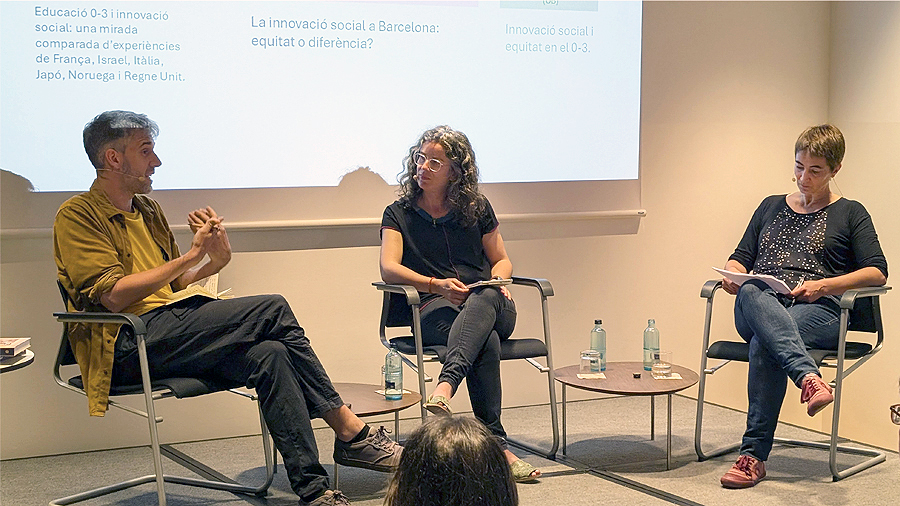Social innovation in early childhood education key to equity and well-being
Researchers from the IGOP-UAB and the UB recently presented the main conclusions of a comparative study in which, together with other researchers, they have analysed the impact of social innovation in early childhood education and care in several international contexts, including the city of Barcelona. The presentation took place at the Macaya Palace in the event “From Tokyo to Barcelona”, organised by the IGOP-UAB and the “la Caixa” Foundation.

The study has been collected in the book Social Innovation and Welfare State Retrenchment. A Comparative Analysis of Early Childhood Education and Care in Europe and Beyond (Emerald Publishing), edited by Raquel Gallego and Lara Maestripieri, researchers at the Institute of Government and Public Policy of the UAB (IGOP-UAB) and, respectively, at the Department of Political Science and Public Law and the Department of Sociology of the UAB, and Sheila González Motos, lecturer at the Faculty of Law of the University of Barcelona. The study included the participation of the IGOP-UAB and was funded by the “la Caixa” Foundation.
The book examines how social innovation can contribute to ensuring equity and universalisation of services for children from zero to three years of age, an area in which social investment is key to equal opportunities and the reduction of gender and educational inequalities. The book offers an innovative research design that studies the process of institutionalisation of social innovation in early childhood education and care (ECEC) through seven cases in different European countries and other territories.
One of the main conclusions is that social innovation has become a key element in the transformation of the welfare state. In four of the seven cases analysed (Oslo, Seine-Saint-Denis, Venice and Tokyo), it was shown that the institutionalisation of social innovation can improve the integration and accessibility of public early childhood education services. The other three contexts (Portsmouth, Barcelona and Tel Aviv) showed that social innovation can fill market and state gaps, meeting family needs in situations where public provision is limited. Even so, in all cases, the regulation of social innovation is key to avoiding socioeconomic biases.
Social innovation in Barcelona: equity or difference?
The event included a round table moderated by Lara Maestripieri with the presence of David Palomera, expert in protection systems for children from zero to three years old, and Maria Truñó, former commissioner of Education at the Barcelona City Council and director of the Education 360 Alliance. The debate raised questions such as the following: What are the most innovative advances and aspects regarding children from zero to three years old in Catalonia? What should be the role of social innovation? And, What policy proposals should be incorporated?
For Palomera, Catalonia drags “a lost decade”, since the cuts of 2011-2019 stopped the historical advantage of the country, and today cause in Barcelona “50% of the unmet demand in public centres”. According to him, this burden forces one to mistrust the rhetoric of innovation: “Talk of social innovation often covers the lack of public initiative”. Palomera highlighted as the main advance the reduction of costs through pricing and considers that the budgetary recovery and the Next Generation funds offer a “window for institutionalising and structuring financing”, but warns that, if not consolidated, free care can benefit above all those who already have resources.
His roadmap, with strong public leadership accompanying social initiative, combines labour dignity (“many teachers in private centres compete just to survive”) and the improvement of ratios to be able to act and achieve a model of “caring city”. This represents deploying flexible services for children from zero to one year (civic centres, community support spaces, etc.), so that the classroom is “just a meeting point” within a care ecosystem, where mothers see their work recognised and which includes men in this care. At the same time, Palomera warns that community innovation without the state can “drive territorial disparities”, particularly in municipalities with little fiscal capacity, and stresses the need to reformulate municipal funding and collect data and indicators to assess what is good and what is not.
For her part, Maria Truñó highlighted the idea of early childhood as a social investment and celebrated the fact that children from zero to three years of age have climbed up the institutional agenda, but warns that free education “has obscured equity: those who need it most do not always have access to it”. She argues that universalising only makes sense if it is done with equity criteria, prioritising vulnerable children through social pricing (including meals) and the reservation of places coordinated with Social Services. And not to forget about the demand for parental leave. Her most solid public innovation proposal is the Network of Municipal Family Child-rearing Spaces, which has grown from 10 to 27 facilities and acts, according to Truñó, as a “gateway to the education system” for families (particularly migrants) who refuse to delegate care at such early ages. Maria Truñó also advocates diversifying services and having day care centres as pillars (flexible schedules, professional childminders, home services, etc.), since families are increasingly unequal and more diverse, and “we still think that needs can be standardised”. Finally, she calls for an interdepartmental approach to children from zero to six years of age.
The event highlighted the fundamental contribution of the study to understanding how the interaction between social innovation and public policy impacts equity and welfare in advanced capitalist economies. As the researchers remarked, the results highlight the need for a flexible policy framework that allows for the incorporation of innovative solutions in early childhood education services, guaranteeing accessibility and quality for all families.
The study conducted by the IGOP-UAB and the UB, Models d’educació i cura de 0 a 3 anys i participació en el mercat laboral: Estudi de la innovació social a la ciutat de Barcelona, was funded by the RecerCaixa programme of the ”la Caixa” Foundation. It can be consulted at the following website: https://webs.uab.cat/primerainfancia/
More information about the book: https://igop.uab.cat/2024/12/04/ja-disponible-innovacio-social-i-reduccio-de-lestat-del-benestar/
Conference video: https://www.youtube.com/watch?v=57JPZiJXyq4